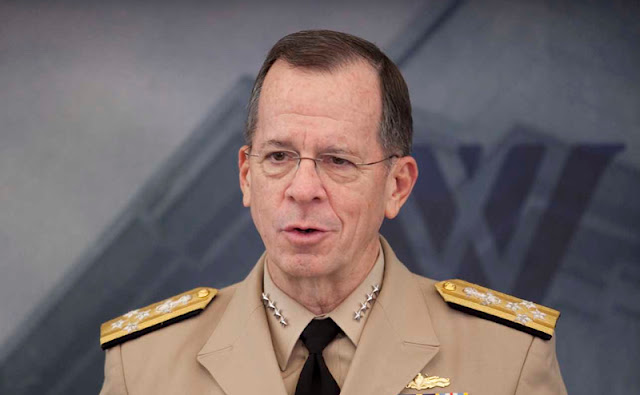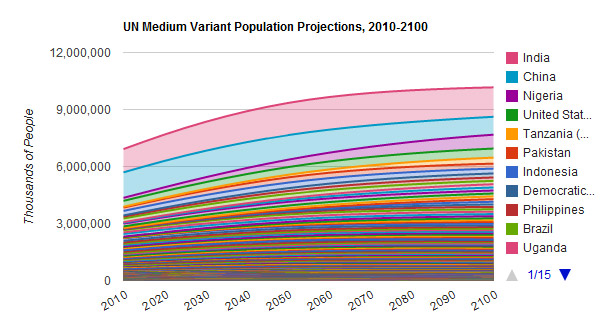Showing posts by Schuyler Null.
-
Inaugural Lee Hamilton Lecture at the Wilson Center
Admiral Mullen: “Security Means More Than Defense”
›Chairman of the Joint Chiefs of Staff Admiral Mike Mullen delivered the inaugural talk in the Lee Hamilton Lecture Series on Civil Discourse and Democracy at the Wilson Center yesterday where he spoke on the importance of “taking the long-view” on U.S. engagement with the world and the changing field of 21st century geopolitics.
Mullen, whose aides, Captain Wayne Porter and Colonel “Puck” Mykleby, wrote the recently launched Mr. Y paper on a new national strategic narrative, echoed many of the same sentiments.
“[The Mr. paper] has some interesting things to say about how we are seeing a shift away from 20th century concepts of power and control to that of promoting strength and influence,” Mullen said. “Frankly, in this small, flatter, and faster world, I think any nation that believes it can, in a very clinical way, control events does so at their own peril.”
“The narrative also happens to share my long-held belief that we must remain engaged internationally if we wish to pursue the world that our children [and] our grandchildren deserve,” he continued:As challenging as engaging others with different views may be, the alternative of abandoning these partners in these regions is far worse. We’ve gone down that road before, and it is one that leads to isolation and resentment, ultimately making our nation less secure as we deceive ourselves into believing that ignoring these challenges will somehow make them go away.
Mullen also agreed with the Mr. Y authors’ view on adopting a more holistic view of national security:
…
Until we restore a sense of hope in these challenged regions, we will see again and again that security without prosperity is ultimately unsustainable.Wayne and Puck put it well when they said we must recognize that security means more than defense. And sustaining security requires adaptation and evolution, the leverage of converging interests, and interdependencies. We must accept that competitors are not necessarily adversaries and that a winner does not demand a loser.
The military’s energy initiatives are an important focus as well, Mullen said. “We’re the biggest consumer of energy in the U.S. government…and I don’t think we’ll ever get to a position where that’s not the case, but we certainly ought to recognize that and figure out a way to do it more effectively, efficiently, and at a much reduced cost.”
What we learned in Iraq is “there were too many people getting killed in long convoys,” Mullen said. The Marines were able to adapt to that threat by developing self-contained green cooling kits, and “that’s where we’re headed,” he said. “Our focus on and investments in the green world has taken off.”
“Now it is really mainstream: The service chiefs, combatant commanders, [they] talk about it,” Mullen continued. “There are investments being made, both from an S&T; standpoint – science and technology – as well as research and development.”
Read the transcript in its entirety here for the Chairman’s remarks on the continued importance of the UN, G-20, and NATO; the short-term intractability of challenges in Iran and North Korea; the rise of China; continued American military dominance; the defense budget; and the Arab Spring, which he called the “most significant change afoot in the world today.”
Photo Credit: Chairman of the Joint Chiefs of Staff Admiral Mike Mullen, courtesy of David Hawxhurst/Wilson Center. -
Watch: Eric Kaufmann on How Demography Is Enhancing Religious Fundamentalism
›May 24, 2011 // By Schuyler Null“There’s a belief, often amongst political scientists and social scientists, that demography is somehow passive and that it doesn’t really matter,” said Eric Kaufmann, author of Shall the Religious Inherit the Earth: Demography and Politics in the 21st Century and professor at Birkbeck College, University of London in this interview with ECSP. “Part of the message of this book is that demography can lead to social and political change.”
“In this case what I’m looking at is the way that demography can change the religious landscape,” Kaufmann said. “It can actually enhance the power of religion, especially religious fundamentalism in societies throughout the world.”
“Purely secular people, who have no religious affiliation, they are leading the move towards very low levels of fertility, even down to the level of one child per woman,” Kaufmann said. On the other hand, fundamentalists are reacting to this trend and deliberately deciding not to make the demographic transition, he said. “In doing so, the gap between secular and religious widens” and is actually more pronounced in places where the two groups collide.
“You can see this in the Muslim world,” said Kaufmann. “If you look at urban areas such as the Nile Delta and Cairo, in those urban cities, women are who are most in favor of Shariah have twice the family size of women who are most opposed to Shariah, whereas in the Egyptian countryside, the difference is much less because they haven’t been exposed to the same modernizing pressures.”
These dynamics affect the Western world as well, especially when you factor in migration, said Kaufmann: “The fact that almost all the world’s population growth is occurring in the developing world, which is largely religious, means that a lot of people are moving from religious parts of the world to secular parts of the world,” he said. “That effects, for example, countries like the United States or in Western Europe, which are receiving immigrants, and it means in the case of Western Europe – which is a very secular environment – that immigrants bring not only ethnic change but on the back of that, religious change; they make their societies more religious.” -
Watch: Edward Carr on Delivering Development and Rethinking Assumptions
›May 13, 2011 // By Schuyler NullWhile visiting West Africa first as an archaeologist, Edward Carr, an associate professor in the Department of Geography at the University of South Carolina and author of Delivering Development: Globalization’s Shoreline and the Road to a Sustainable Future, found that the villages in which he was working were far more resilient to the impacts of climate change than he expected. Increased frequency of drought, declines in rainfall, severe storms – these challenges are the sort of thing that can “totally destroy someone’s livelihood in a year,” he said in an interview with ECSP, “yet they were surviving and surviving really, really well.”
That experience and others challenged his understanding of “how I thought the world was supposed to work, how I’d been taught the world was supposed to work, versus what I was actually seeing happen on the ground,” said Carr. “I became so struck by what people were dealing with in the current context that my interest started to shift much more towards what they were doing now.”
Now serving as a AAAS fellow and the climate change coordinator for the Bureau for Democracy, Conflict, and Humanitarian Assistance at the U.S. Agency for International Development, Carr said he is trying to change how the U.S. government does development.
“The last 13 years of my career have been trying to figure out what’s actually happening on the ground first,” Carr said, and that led to writing Delivering Development.
“One of the key arguments I have is that the world does not work the way we assume it does – we are fundamentally misunderstanding what’s happening for most people living out, especially in rural areas, in the developing world,” said Carr. “The challenges they face are significant but not necessarily the ones we’re aimed at.”
For example, said Carr, “we see rising food prices globally and…the presumption is that the poorest people in the world are going to get really hammered by this.” But, he said, “That’s not entirely true, because a lot of the poorest people in the world living in rural areas have an option to just disconnect from markets completely – they go total subsistence if they need to.”
There’s an assumption that people shouldn’t be disconnecting like that, but, Carr pointed out, when new places are integrated into larger markets, “we’re also integrating them into new sources of risk that they may not be very well equipped to manage, and that becomes a really significant challenge.”
“We’re starting with the fundamental assumption that markets can be a solution, without necessarily really looking carefully at how markets can be part of the problem,” said Carr. -
Ten Billion: UN Updates Population Projections, Assumptions on Peak Growth Shattered
›May 12, 2011 // By Schuyler NullThe numbers are up: The latest projections from the UN Population Division estimate that world population will reach 9.3 billion by 2050 – a slight bump up from the previous estimate of 9.1 billion. The most interesting change however is that the UN has extended its projection timeline to 2100, and the picture at the end of the century is of a very different world. As opposed to previous estimates, the world’s population is not expected to stabilize in the 2050s, instead rising past 10.1 billion by the end of the century, using the UN’s medium variant model.
-
How Does Organic Farming in the U.S. Affect Global Food Security?
›The feature story for last month’s Wilson Center newsletter, Centerpoint, was on the popular full-day conference “Rebuilding the U.S. Economy – One Heirloom Tomato at a Time,” hosted by the Program on America and the Global Economy in March. The conference focused on organic, local farming and the idea of creating “sustainable” food production that was healthier but also better for the economy than relying on imports from afar.
ECSP was asked to provide some international context for the discussion with a brief “Point of View.” I tried to paint a little bit of the big picture 21st century supply and demand story and give a sense of how today, globalization has helped linked everyone in this food security discussion:Dramatic events over the last year have shone a spotlight on the problem of global food security: massive fires in Russia, which reduced wheat supplies; famine and drought in Niger and Chad; and food price riots in the Middle East and elsewhere. These stresses come amid price spikes that echo the food crises of 2008 and reveal the linked nature of food security today and some of the fundamental challenges facing poor countries’ efforts to feed their growing populations.
What do you think: What’s the best way to inject the urgency that people looking at demographics and consumption rates around the world are feeling about global food security into a discussion about organic agriculture in the United States? Is there a tension between quality and quantity of food in the organic vs. agrobusiness debate that needs to be addressed in a global context? And what’s the role of policy in determining that balance?
In most countries, food insecurity is a symptom of poverty, poor governance, and/or poor infrastructure. For example, developed countries can often rebound from natural disasters relatively quickly. However, in drought-prone countries like Niger and Chad or flood victims like Pakistan and North Korea, such structural weaknesses leave them unable to bounce back as quickly from extreme events. This makes development efforts more difficult and can cause vulnerable countries to quickly become a burden on their neighbors or more prone to internal instability.
In the long term, reducing vulnerability in developing countries will be one of the most critical factors to ensuring global food security. But to meet the projected demand from increased consumption and continuing population growth, global yields must also increase.
The Green Revolution of the 1960-70s saved millions of lives by introducing heartier strains of rice and improving other staple crops in South and Southeast Asia, and most agree that a “Second Green Revolution” (whether or not it looks like the first) will likely be necessary. If so, the current tensions in the West over organic or sustainable practices versus agribusiness models will need to be reconciled in a way that can provide the most immediate help for the world’s hungry.
An important requirement, however, is that in a more resource-constrained world, these yields must be increased without destroying our future capacity. How we go about this, whether through traditional industry, organic techniques, or a mixture of both, will be one of the defining challenges of the 21st century. -
Top 10 Posts for April 2011
›The launch of the “Mr. Y” national security narrative here at the Wilson Center topped the list of most popular stories last month, but IFAD’s latest rural poverty report, two interview features on population and development, and Richard Cincotta’s predictions on Tunisia also made the top 10.
1. In Search of a New Security Narrative: The National Conversation at the Wilson Center
2. Rural Poverty: The Bottom One Billion
3. Watch: Roger-Mark De Souza on the Scaling Advantages of Population, Health, and Environment Integration
4. Watch: David Lopez Carr and Liza Grandia on Rural Population Growth and Development in Guatemala
5. India’s Maoists: South Asia’s “Other” Insurgency6. Managing the Mekong: Conflict or Compromise?
7. Tunisia’s Shot at Democracy: What Demographics and Recent History Tell Us
8. What “Lost” Cultures Can Contribute to Management of Our Planet
9. Dot-Mom: Innovations From Development to Delivery: Working With the Private Sector to Improve Maternal, Newborn, and Child Health
10. Tunisia Predicted: Demography and the Probability of Liberal Democracy in the Greater Middle East -
Watch ‘Dialogue’ TV on Integrating Development, Population, Health, and the Environment
›Last week on the Wilson Center’s Dialogue radio and television program, host John Milewski spoke with Geoff Dabelko, director of ECSP, Roger-Mark De Souza, vice president for research and director of the Climate Program for Population Action International, and George Strunden, vice president of Africa programs for the Jane Goodall Institute. They discussed the challenge of integrating population, health, and environmental programs (PHE) to address a broad range of livelihood, development, and stability issues. [Video Below]
“Many times that we tackle development or poverty and human well-being challenges…we do it in an individual sector – the health sector, or agriculture sector, or looking at issues of water scarcity – and it makes sense in many respects to take those individual focuses,” said Dabelko. “But of course people living in these challenges, they’re living in them together…so both in terms of understanding the challenges…and then in responding to those challenges, we have to find ways to meet those challenges together.”
De Souza noted that the drive for integrated development stems from the communities being served, not necessarily from outside aid groups. “We’ve seen that there’s a greater impact because there’s longer sustainability for those efforts that have an integrated approach,” he said. “There’s a greater understanding and a greater appreciation of the value that [PHE] projects bring.”
Strunden said that the Goodall Institute has found similar success in tying health efforts with the environment in places where previously conservation work alone had been unsuccessful.
The panelists also discussed the role of population in broader global challenges, including energy, water, and food scarcities, and women’s rights.
Dialogue is a co-production of the Woodrow Wilson International Center for Scholars and MHz Networks. The show is also available throughout the United States on MHz Networks, via broadcast and cable affiliates, as well as via DirecTV and WorldTV (G19) satellite.
Find out where to watch Dialogue where you live via MHz Networks. You can send questions or comments on the program to dialogue@wilsoncenter.org. -
Watch: Jennifer Dabbs Sciubba on Population and National Security
›April 28, 2011 // By Schuyler Null“Long-term trends really are what shape the environment in the future,” said Jennifer Dabbs Sciubba in this interview with ECSP. “As we’ve seen recently with…revolution in North Africa, it’s the long-term trends that act together for these things to happen – I like to say demography is not usually the spark for a conflict but it’s the fodder.”
Sciubba is the Mellon Environmental Fellow in the Department of International Studies at Rhodes College. In her new book, The Future Faces of War: Population and National Security, she discusses the importance of demographic trends in relation to security and stability, including age structure, migration, youth bulges, population growth, and urbanization.
One of the most important things to emerge from the book, said Sciubba, is that countries that are growing at very high rates that are overwhelming the capacities of the state (like many in sub-Saharan Africa) really will benefit from family planning efforts that target unmet need.
Afghanistan, for example, “has an extremely young age structure,” Sciubba pointed out. “So if you’re trying to move into a post-conflict reconstruction atmosphere…you absolutely have to take into account population and the fact that it will continue to grow.”
“Even if there are major moves now in terms of reducing fertility, they have decades ahead of this challenge of youth entering the job market,” Sciubba said. “Thousands and thousands more jobs will need to be created every year, so if you have a dollar to spend, that’s a really good place to do it.”
For more on Jennifer Dabbs Sciubba and The Future Faces of War, see her book launch at the Wilson Center with Deputy Under Secretary Kathleen Hicks of the Department of Defense (video) and some of her previous posts on The New Security Beat.







